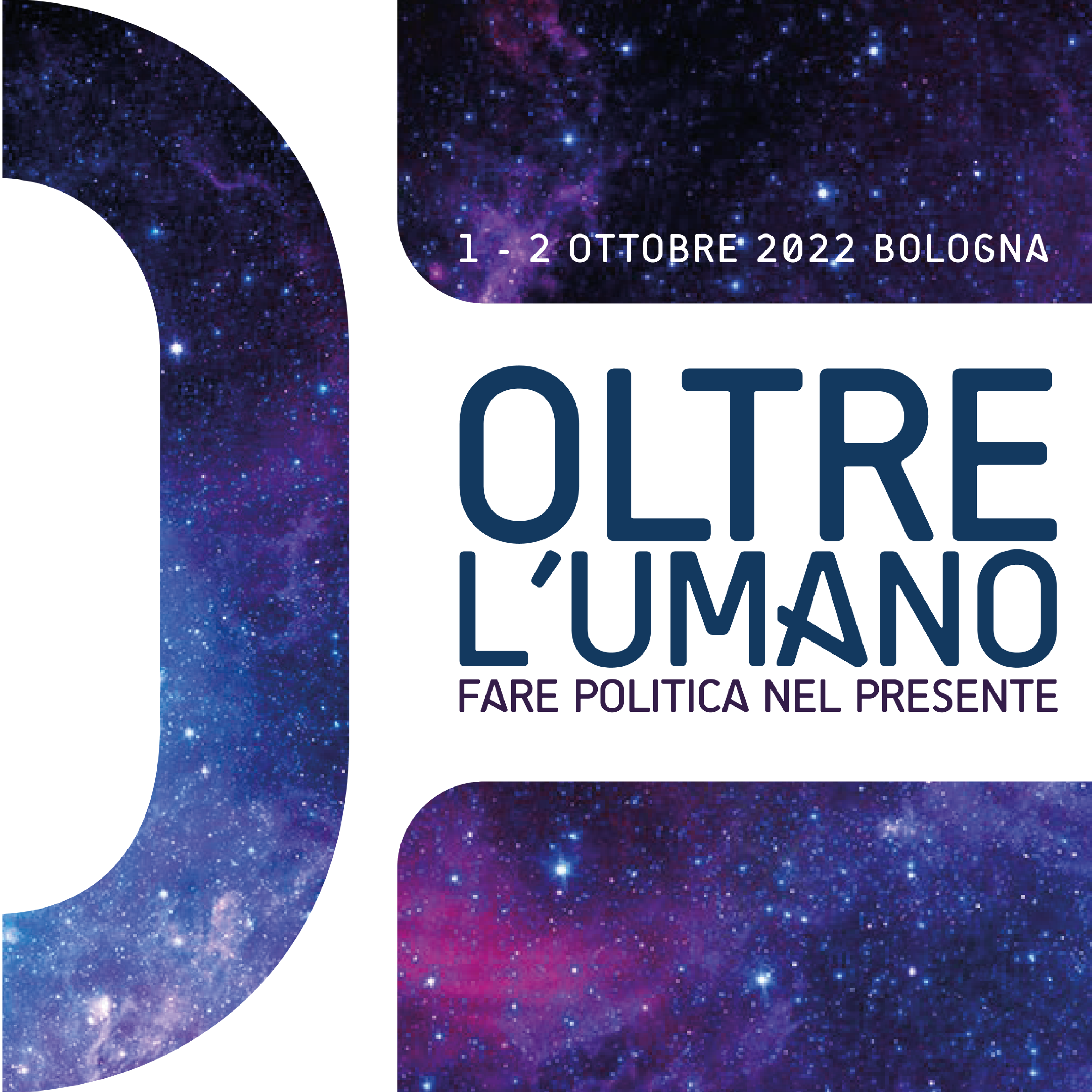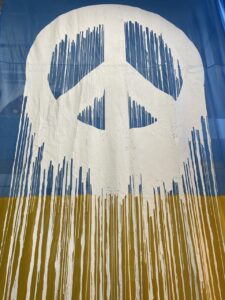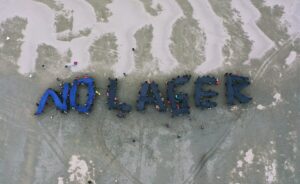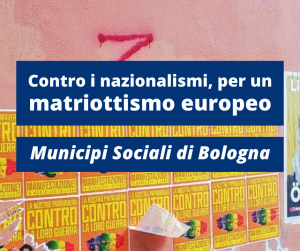An invitation for two days of meetings and discussions to build a theory and a praxis of transformation
1-2 October 2022, Bologna
Introduction
We are living in a time of transition towards a new Era that goes beyond the human. In the past episodes (beyond the human, beyond the posts, beyond… you can’t put the tooothpaste back in the tube; beyond human #2, the future begins today not tomorrow) we have highlighted some of the points that seemed important to us in order to start reasoning: it is no longer the time of the “posts”, nor it is yet the one of the “beyonds”. The nature/technology, human/non-human dichotomies no longer work, and now the concept of hybrid is essential to dwell into the contradictions. Between sacred and profane we choose the profane, standing by the side of materialism and knowledge, against superstitions and absolutism. Financial capital is the relationship existing between the algorithm, work/life rapport and the different forms of subsystemic control. Subsystems are not just nation-states: some of them may refer to ancient empires, tsars, sultanates, emirs. We can count in Political Islam, the Chinese Communist Party, and also private subsystems like Elon Musk’s; all of them aspire to take part in the great game, and in this scenario war is hybrid, the continuation of politics with other mean in order to sit at the table of financial command.
If debating these issues already couldn’t allow us to rest on comfortable certainties, after Putin invaded Ukraine and war broke out, new elements have been added to challenge the complexity. The following proposal of reasoning is the invitation to a multidisciplinary discussion, aiming to make room for heretical points of view able to build up thoughts and practices of transformation.
Beyond the End of History
Stating that History is not over is a starting point that still distinguishes us from many other current trends. From sacred thought to the climatic catastrophism, from geopolitical realism to the anti-vax conspiracy. These trends, all different, are united by seeing things as immutable and by fleeing into the certainties of past times in order to defeat the fear of impending catastrophe, or to preserve ancient powers.
With the war in Ukraine, these kind of tendencies find way more reasons to establish themselves than the ones they found debating the pandemic or the climate crisis. Fear is the constant on which they rely, but this time they state their legitimacy by using an affected concept of peace, that is much more difficult to scratch. Instead of seeing the huge historical movement happening, in which the subsystems are in ferment and war is in continuity with the financial command reacting to epochal changes, it is stated that any action to counter Putin’s aggression can only contribute to a nuclear disaster portrayed as the end of humanity and history. Before the invasion, in February we had already shown how absolute arguments of this kind plunge us back into the side of the sacred, therefore in a clear opposition with the profane represented by the proliferation of knowledge, and the appropriation of the hybrids man-woman-+, nature-knowledge-technology, earth-space-digital, for the transformation.
War and peace
It seems to us that the dualism “war or peace” is being used today as an absolute that excludes any possibility of resistance. If you resist invasion and bombings by a patriarchal, oligarchic, imperial subsystem, then you are for war and against peace. It doesn’t matter if you do it to defend your home, your relationships, the territory or the the city you chose to live in. It does not matter if you are a civilian self-
defense group. It doesn’t matter if you do it because you simply can’t stand a dictatorial regime like Putin’s. Whatever you do, you are either for peace or for war. As if to be against war, one must automatically be a “pacifist.doc” and not that, contrairly, a war of aggression, invasion, plunder can be resisted “by any means necessary”. And so if you accept the conditions posed by the aggressor, submitting to him, delegating diplomacy to a third party country such as Turkey, then you are for peace and against war. The war/peace dichotomy leaves no room for alternatives. Another problematic aspect of the war/peace dichotomy is related to the old bipolar World that some still believe they live in. For those who console themselves with the certainties of the past, being against war almost automatically corresponds to being against the United States, while standing for peace means to be on the side of the world’s other populations. This dualism was already beginning to be broken by the anti-war struggles of the early 2000s, that saw in the American imperial control a new way of understanding relationships in the global world, and elaborated the alternatives of another possible world precisely around this trend. What is called today’s multipolar world is the result of those struggles that didn’t surrender to the existing conditions and of the many contradictory patterns that challenged the imperial dimension. Today, the challenge is to think of an alternative able to measure up to the multipolar world. However, in order to do that, we need to get rid of the absolute war/peace dualism, that only creates a huge confusion.
Alternative sovereignty
If in the early years of the XXI Century the struggles for alternative stood up to the American-led global empire, setting ourselves up to the transformations taking place nowadays means following some non-granted trends and forcing some concepts, including that of sovereignty. Financial capital is formed on the overall social/digital activities of and between subsystems. It is for its control that the algorithms of calculations and forecasting are produced, imposing forms of command. In all subsystems, not only in Putin’s Russia, inequalities develop and economic oligarchies prosper, using various forms of command. Oligarchs are the new Capitalists. War shows that hitting Russian oligarchs can be an impromptu military manuever, and that it’s possible to do that. But it certainly has nothing to do with the redistribution of wealth, as we conceive it. Oligarchs themselves often express the strength of real subsystems. They impose how to use satellites, they decide when to open and close gas taps, they affect prices, they affect policies, especially climate policies. This would be enough to state that the tendency to create hybrid forms of sovereignty in spaces different than the nation-state is very strong. Before the affirmation of Chinese, Indian, Arabic and Turkish power, this kind of trend would have been called “neoliberal rationality”. A system based on the powers of liberal representative systems, but capable of acting beyond them by creating new systems. The new hybrid fields of technologies, space, digital, are a spot-on example of those spaces where a hybrid sovereignty operates. Today it is difficult to say that what happens in the above mentioned subsystems has something to do with liberalism or pseudo-liberalism. For this reason, talking about algorithms of financial command seems more appropriate than talking about neoliberalism. The old sovereignty of the nation-state, where sovreignty is intended as financial control, is therefore coming to an end, or is at least coexisting with the new tendencies. But considering the strong nationalist trends and imperial ambitions taking place, we cannot simply wait for nation-states to spontaneously die out. We must think about how to force this dynamic, what tools to equip ourselves with. Alternative sovereignties are none other than new powers surpassing the old ones. Communism was an experiment in this direction, but in order to think of a sovereignty that already poses itself beyond the nation-states and with the characteristics of liberation, we must seek something new.
European Matriotism
Let’s take a step back. European Union has represented a model of neoliberal rationality, with politics that pushed towards private appropriation, impoverishment and inequalities, the creation of precarious life and work forms. The EU’s building course has always found numerous opponents, internal and external, first and foremost the national identity, used as a baton against migrants and post-national political unions. Neoliberal rationality has precisely let countries like Sweden and Hungary coexist. And it is for this same reason that many consider this coexistance an announced catastrophe. However, for the first time, Europe had opted for sharing the debt, and topics like pollution, energy, salaries, income, health, gender inequalities and digitalization were about to find through the EU Recovery Plan an enormous potential field of struggle for the years to come. Sure, we’re not talking about a great unified struggle, also because the post-pandemic unfreezing process has just begun, but that type of space of development could and still can aim to do that (even though as of today we would rather find ourselves discussing how to confederate the
struggles against the opening of new coal-fired power plants, rather than fighting for renewable non-polluting energy and against gas. A step back that might be enormous).
European sovreignity as we know it is fragile, and it probably risks not to surpass the upcoming years in its integrity, let alone emerging reinforced. But if alternative destructive sovreignities are always on EU’s door, why don’t we think about a sovreignity that is alternative to the one of the EU, in a larger political space and with more democracy? One that is not anymore slave to atlantism, and therefore to NATO, also capable in this liberated form to face the topic of common defence? The struggle in this direction is what we call European Matriotism.
Euro-mediterrean sovreignity and democratic confederalism
The idea we have in mind is double. On the one side, we want to confront ourselves around the idea of an alternative sovreignity that is already beyond the nation-states, openly ecologist and feminist, in a chain of spaces different from traditional ones. The euro-mediterrean space is already a breaking point compared to the traditional idea of europe, and can give an enormous contribution to this struggle. We would like to experiment a discussion of this kind with mediterrean, eastern, EU and non-EU, baltic countries. We are interested to talk with struggles and emancipation paths developing in the cities, in the Countries and in the border areas, paths of territorrial autonomy which are already strong in europe, and new autonomies. With subjectivities of struggle, but also with local experiencies both of government and opposition, convinced that this dualism, if all inserted within the logics of representation, doesn’t help describing the most interesting experiences, from Zagreb to Bologna, from Belgrade to Barcelona. One can be in the government or in the opposition depending on the context, what counts is what you’re fighting for. The second point is that if we want to challenge ourselves on the field of new patterns of alternative sovreignities that could overcome nation-states, why don’t we look strongly also outside of europe? Can the democratic confederalism of the kurds, the idea of a “non-statal political administration, or a no-state democracy” just like Ocalan writes, be a model, rethought into the euro-mediterrean political space?
Against sacred and depression, we need heretical thoughts and practices of complexity
Within this discussion that rocks our comfort-zones, we’re willing to host hybrid and heretical points of view. We want to confront ourselves not only to create simple networks, but to have a common outlook on complexity. We know how hard it is. After the pandemic, war broke out. There are people who say that the refusal to and the exodus from work are caused by a double depression that’s due to these continuous and chained crisis. True or false, in the current conditions the statement is that it is hard to mantain even a partial activity in a non precarious way. Let alone how hard having an outlook on complexity can be, without falling into catastrophism or sacred formulas. Moreover, if social work is precarious and generates exodus, sometimes along with feelings of defeat, political militancy is also becoming more and more precarious. Both are so precarious that they touch each other, and that they make us wish that what could surpass the work/militancy dualism can be found in an encompassing project to fight for. Encompassing, however, does not mean complicated. Catastrophe generates fear, but we reassure us telling ourselves that is the world doing something wrong, not us. As soon as we try to consider the complex situation this appears to be too complicated to us, and we find shelter into particularisms, in conspiracy theories, in past-time models, in the sacred. “The war in itself is the problem”, not the reasons why it’s been started or the reasons why people resist to an aggression. “Let’s isolate ourselves as a country, do not bring the war here”. “Those who resist the aggression are making a mistake, because they feed the war by doing so”. So what should they do? As if things were better before. Someone actually thinks that the nuclear deterrency of the old bipolar world was a better thing than the current situation, something we should wish for and try to go back to. With the same spirit it is being said that the “primitive” way to face the relationship with nature has been better than the current one, free from distructive elements. Degrowth is evocated while abandoning the political field of hybrid technological development, one that is able to make the ecosystems better places to be in and less likely to develop new forms of pandemics… We’re talking about radical struggles for sabotaging polluting production chains. Income is discussed in the same way. Not as a measure to be defended with struggles, but as a political measure that will forever remain incomplete. But as weak and incomplete as it might be, basic citizenship income is the closest we get to an efficient political tool in front of the current precarious work tendencies, that prevents from economic, social, medical and geological turbolences, and that could serve as a tool to develop free forms of social work. Also in this case, complexity crushes, instead of acting as the transformative potential. Everything appears to be immutable in theory, while things go back in time in the material aspect. During the Mayday parade, in Bologna, a banner said: “zero work, full income. All production to automation”. Let’s jump forward, let’s claim our right to leisure, and to one that is paid with the billions that get stolen from the complex social work by the financial algorithm. But without an outlook on the complexity where all the real forces generated by the hybrid systems in which we live in end up, will we be able to transform anything? We lose the sight of them, or, even worst, they get considered as enemies of change because they are seen as partners of the current systems, uncapable of overthrowing the state of things – this is what the critics say on their ideal standpoint – “sell-outs to the system”, “pro-Americans”, “warmongers” etc. But it is enough to see the key role that Elon Musk has assumed in the current situation, the importance that hybrid technologies will have in the new era, to understand how certain statements are only the result of lazyness and theoretical purism, while criticism must be shifted on the material standpoint. It is proper of the religous thought, of the sacred, to find room in such occasions. Sacred is pure, not stained by any sin. It relies on higher powers in alternative to the end of History and does not consider the hybrid man-woman-+, technologies, species, different ecosystems as allies for transformation. Thus, they get exorcized. Not only churces, religions, or identitary cults are the ones finding their room through fear, against the materialism of prophane, but also subjectivities that, once one of the many problems of the current world is identified (climate crisis, gender violence, hunger, digital, war), build their own narration around it, with practices that get very close to mystical and spiritual, ending up to agree to the fact that only a superior power will change things, and without dealing with the problem of bulding up a stronger counter-power.
These are only tendencies, but tendencies that force us to put network and differences politics, as we have always considered them, in discussion.
Beyond differences, for the politics beyond human.
If network and differences politics has made us realize how varied struggles can be and about the intersectionality that can be found in all the mechanisms of exploitation and violence, today it seems to us that this approach has lost its transformative potential. Networks and differences are at the bottom of a large and transformative approach to society, but are not concepts that help us to dwell materially into the contraddictions. In this sense, the concept of hybrid is more useful, because it keeps together the differences, but talks about a transformation unraveling through any aspect of life. At the same time, the return to the past feeds the narration of other counterparts. Nationalisms, conspirationisms and also post-colonialists, third-worldists, ex-communists for whom a multipolar world that takes steps back on rights, freedoms, on nature-technologies and science will forever be better than the old American-carried world.
The thought of catastrophe makes people freeze, and draws them back. But new political identities are preciesly founded against those thoughts of absolute and sacred, for complex alternatives, beyond the
human limit. To conclude, let’s think about the man-woman difference. With the war moved by the patriarchal Russian regime, this is worryingly going back on trend. Warfare is narrated as a male-centered
thing, while women must remain home. Also among those who declare themselves to be on
women’s resistance side, the sneaky concept that women are good on care-work, and that if it was for
women there would be no war, often lies. Of course, when the world will be governed by a bigger number of women, lgbtqi+, animals, cyborgs that would have had facilitated overcoming the man-woman difference and the end of many existing subsystems, we are confident that the chances of war will decline. When we will fight for European Matriotism and for the Euro-mediterrean confederalism we are confident that we will get closer to that excellent ideal; but meanwhile, can we at least recognize the importance of standing with women, men and more that resist in Europe and not only, using force and weapons to defend and care for themselves, precisely in order to be able to think of that alternative? Many topics, many hints and suggestions, many questions. We are convinced that if we dont stay in the true Tendencies of reality, if we don’t play in advance, the risk is to always keep waiting, sadly surrounded by “ifs” and “but alsos” and to be impotent and never true protagonists of change. “Take the time” and/or “Nothing ventured nothing gained” is the tune we’ll try to play, in the first two days of october, in Bologna.
TWO-DAY SCHEDULE
The moments making up the two days are designed in synergy between each
other, to start an open discussion with several voices, on the different levels
interacting in the complexity.
SATURDAY OCTOBER 1st, H.15
Beyond the human, beyond the end of History
Multidisciplinary talk for the construction of a new materialistic thought. We live in an era of
transition. lt is time to go beyond the repetitive interpretations of reality to face the challenges
of the future, to overcome dualisms and comforting differences, to act in the times of the hybrid.
SUNDAY OCTOBER 2nd, H.10
Beyond war and peace for transformation
Matriotism for a Euro-Mediterranean democratic confederalism, alternative sovreignity, Euro-Mediterranean area, constituent conflicts in europe. Europe is not our homeland, but it is our
“motherland” already beyond the nationstate to fight for. Rather than lexical choices, what interests us is the construction of an alternative EuroMediterranean sovereignty expressly ecologist and feminist. How do we come up with proposals of meetings and mobilizations that can be giving strength to this perspective?
H.15
“Batti il tuo tempo”: inside the territories of the present
Assembly for the defense of citizenship basic incarne and the conquest of universal incarne. At the May Day Parade we were in the square with the banner “Lavoro zero – reddito intero” – “Zero work -full incarne”. We want to set out from there, starting from our experience, in the Municipi Sociali, places where mutualism, urban conflicts, unionism and administrative links are practiced, and meeting new experiences. Today in ltaly there is a law on basic citizenship incarne, a fact, a new and important piece,
beyond its genesis, which is currently under attack from multiple sides. Would be really absurd to ignare it, especially since this law, as journalistic and non-journalistic analysis say, has been used to avoid underpaid, non-contracted and super precarious jobs in rnany cases.
Precisely us, who have always struggled to regain possession of the wealth, produced by all and plundered by a few, cannot be passive spectators.
We have to fight to defend the law on basic citizenship incarne, free it frorn the knots and snares tying that up to the farce of job search and rnake it a stage for strongly e definitively affirrning universal incarne as a right of every individuai, for leisure and for a life free frorn work.
